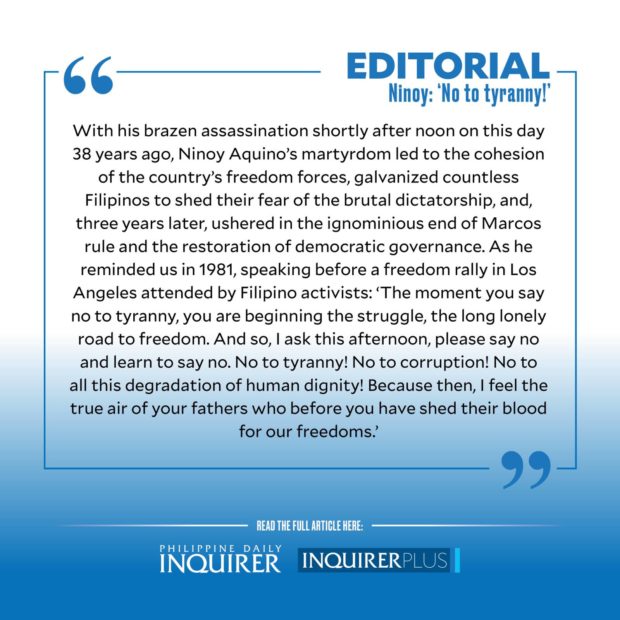Ninoy: ‘No to tyranny!’
Thirty-eight years ago, the country was rocked by the assassination of Benigno “Ninoy” Aquino Jr. While a few hundred of his supporters had gathered at the airport that now bears his name and there learned of his fate, for most Filipinos the news of Aquino’s death, and the horrific events of the day, unfolded on blurry television screens, the camera lingering on Ninoy’s prone figure, sprawled on the tarmac. Nearby lay the unfamiliar form of a man authorities later identified as Rolando Galman, the so-called “lone gunman” whom the Marcos regime would blame for Ninoy’s demise.
That most Filipinos commemorate today the martyrdom of the opposition leader who had braved the warnings of the Marcos regime that he risked his life if he set foot on our native soil, and ignore or treat as a mere footnote the killing of Galman, is a testament to the fleeting and fading memories of the public. But Ninoy’s place in history, and the significance of his death, remains secure, more than three decades hence, and despite the shifting winds of political favor and public opinion.
Article continues after this advertisementThere is no definitive account of what may have motivated the dictator Ferdinand Marcos, his wife (and presumed political heir) Imelda, as well as members of the ruling cabal, to accede to Ninoy’s request to be allowed to travel to the United States to undergo heart surgery. But it is reasonable to presume that sending Aquino abroad for “humanitarian” purposes, after having incarcerated him for seven years, suited the Marcoses’ pretenses of being benign rulers. After all, even while behind bars and recovering from a hunger strike that came close to killing him, Ninoy was still a compelling figure, a lightning rod for a political opposition still searching for a symbol around whom they could gather and martial their forces.
Perhaps the Marcoses also hoped that once ensconced in the US in the bosom of his immediate family, Ninoy would find peace of mind and equanimity and abandon his resolute opposition to the dictatorship. And true enough, his daughter Kris would later say that those years in Boston were the happiest the reunited family ever savored.
But the Marcoses guessed wrong. For even while Ninoy enjoyed the simple joys of family life and indulged his hunger for scholarly debate and theorizing in Harvard University, he still hungered to play a role in Philippine politics and fight for its throttled democracy. Before martial law was declared, Ninoy was widely considered the most formidable challenger to Marcos. Among the political greats confronting the dictator (Jose Diokno, Jovito Salonga, Francisco “Soc” Rodrigo, et al.), Ninoy was the first to be arrested, was imprisoned the longest, and was eventually sentenced to death until his travel to the US.
Article continues after this advertisementWhen news of Ninoy’s planned homecoming circulated, in the wake of reports of Marcos’ worsening health, the Marcos machinery scrambled for ways to impose damage control. But the method they used–to try to erase from this earth the existence of the biggest irritant to Marcos’ absolute rule–would instead result in the ascendance of Ninoy Aquino from mere politician to martyr, from oppositionist to paramount symbol and inspiration for the anti-dictatorship struggle.
With his brazen assassination shortly after noon on this day 38 years ago, Ninoy’s martyrdom led to the cohesion of the country’s freedom forces, galvanized countless Filipinos to shed their fear of the brutal dictatorship, and, three years later, ushered in the ignominious end of Marcos rule and the restoration of democratic governance. (The Marcoses, sadly, remain persistent, impenitent barnacles in the country’s politics.)
By virtue of Republic Act No. 9256, this day is now observed throughout the country as “Ninoy Aquino Day”—though in the last few years, the observance of his death anniversary, as well as that of the Edsa revolt that resulted from his sacrifice and those of the many more who gave up their lives to resist martial law, has been greatly reduced in terms of official enthusiasm and ritual.
But for all the efforts to diminish his legacy, Ninoy’s place in the national consciousness is unalterable. As the country faces a pivotal election next year that will determine its trajectory after six years of an administration that has shown disdain for hard-fought democratic norms, Ninoy Aquino continues to provide guidance to all Filipinos who care deeply about their country.
As he reminded us in 1981, speaking before a freedom rally in Los Angeles attended by Filipino activists: “The moment you say no to tyranny, you are beginning the struggle, the long lonely road to freedom. And so, I ask this afternoon, please say no and learn to say no. No to tyranny! No to corruption! No to all this degradation of human dignity! Because then, I feel the true air of your fathers who before you have shed their blood for our freedoms.”

















